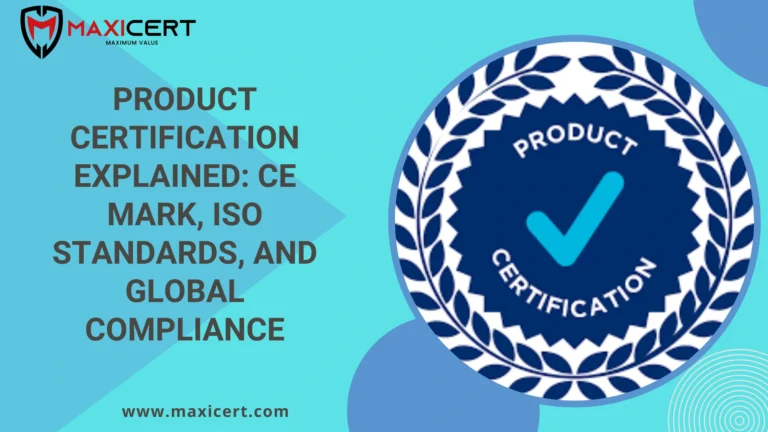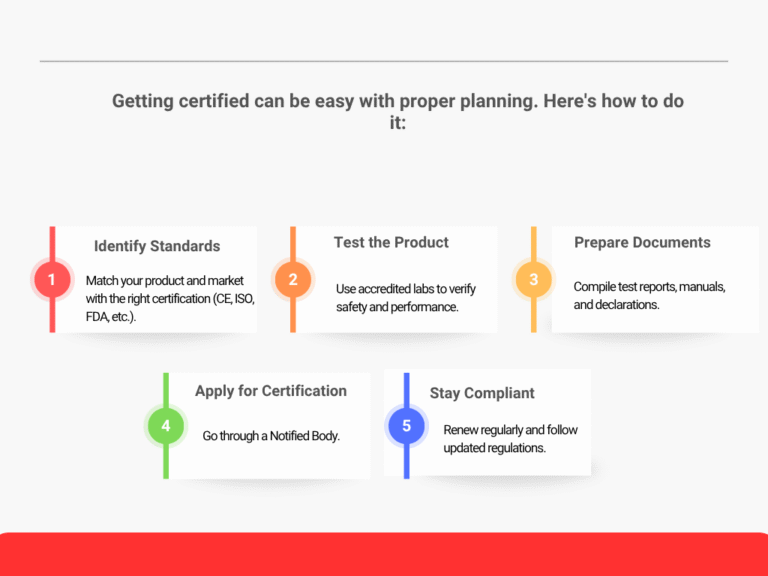Product Certification Explained: CE Mark, ISO Standards, and Global Compliance

Introduction
With today’s globalized world, the reputation a product gains is as important as the product itself. Whether you’re dealing in electrical items, medical instruments, or foodstuffs, product certification is the biggest step toward making that reputation happen—locally and internationally. But what exactly does product certification mean? How are CE and ISO certifications different? And why should companies take compliance seriously even before going live?
This guide demystifies it all.
What Is Product Certification?
Product certification is an official procedure that verifies a product complies with particular safety, quality, and regulatory requirements. It ensures customers, regulators, and importers that your product has been tested or verified outside of its production environment for conformity.
Compared to company certifications such as ISO 9001 (which evaluate management systems), product certifications target the features, safety, and usability of the product directly.
It’s your product’s passport to international markets.
Related: ISO Certification – Maxicert
Request A Free Quote
Major Types of Product Certifications
Product certifications differ based on the sector, location, and market needs. These are the most known types:
CE Certification (For Europe)
CE marking for a lot of products being marketed in the European Economic Area (EEA) is required. It indicates that a product meets EU safety, health, and environmental protection directives.
What CE Certification Covers:
Electronics and electrical devices
Machinery
Toys
Medical devices
Construction products
Depending on the type of product, you might need to appoint a Notified Body to test and evaluate your product prior to applying the CE mark.
Read more on Wikipedia – CE Marking
ISO Product Certifications
International Organization for Standardization standards are global standards accepted by everyone that prove your product has been created, tested, and regulated with universally endorsed practices.
Typical ISO Certifications for Products:
ISO 13485 – Medical devices
ISO 22000 – Food safety products
ISO 50001 – Energy-using devices
ISO 9001 – Quality assurance (applied to product design & delivery)
ISO certification mainly assesses a firm’s system, but when applied to product development, it functions as a strong trust indicator for product quality.
Learn more about ISO Services by Maxicert
Industry-Specific Certifications
Certain certifications fall under national or regional regulatory bodies. For instance:
FDA certification (U.S.): Medical devices, food, and cosmetics
BIS certification (India): Steel, electronics, chemicals
FCC, UL, RoHS (Global/USA): Electrical and safety-related labels
Every label serves a special purpose, and not getting the correct one can lead to product bans or penalties.
Why Product Certification Is Necessary
Whether you’re an upstart selling handmade gadgets or a manufacturer looking to enter global markets, here’s why product certification is unavoidable:
Legal Access to Markets
- Without appropriate certification, your product might be held up at customs or rejected entry into markets such as the EU or U.S.
Consumer Trust
- Certified products are favored by safety-oriented consumers and businesses.
Competitive Advantage
- It will assist you in securing large-scale supply tenders, government contracts, or retailing deals.
Brand Protection
- If there is a product defect, proper certification can limit legal liability or fines.
The Product Certification Process: Step-by-Step

Common Mistakes to Avoid
Most companies fail during certification. Watch out for these:
Implementing outdated standards
Misassuming that all certifications are “global”
Plagiarizing logos without gaining them
Overlooking country-specific requirements such as SONCAP in Nigeria
Regulatory Authority: Standards Organisation of Nigeria – SON
How to Choose the Right Product Certification
Picking the right product certification is important. It saves time, money, and helps you enter your target market smoothly. Here’s how to choose:
1. Know Where You Want to Sell
Different countries have different rules.
Europe needs CE marking
USA may need FDA approval
Nigeria may require SONCAP
2. Check Your Product Type
The type of product you sell matters:
Medical devices: ISO 13485 or FDA
Food items: ISO 22000
Electronics: CE, RoHS, or FCC
3. Ask Your Buyers
Some buyers, retailers, or tenders ask for specific certifications. Check before applying.
4. Get Expert Advice
Working with a certification expert helps you avoid mistakes and choose the right path from the start.
The right certification builds trust and opens doors to bigger markets.
How Maxicert Supports Product Certification
Maxicert works hand in hand with manufacturers, importers, and exporters to assist them throughout the process of product certification.
Our Services Feature:
Advisory on selection of the appropriate certification standard
Drafting all technical documentation
Coordination with testing bodies or Notified Bodies
Performs ISO compliance audits
Assists renewals and re-certification
No matter if you’re getting ready for CE marking in the EU or ISO certification for product quality, we make it easy so you remain compliant—and competitive.
Contact: Maxicert today
Conclusion
Product certification is not merely a matter of checking boxes—it’s about going into markets with confidence and demonstrating to the world that your product is safe, reliable, and competitive on the world stage.
Whether you’re seeking CE marking in Europe, ISO product assurance, doing the right thing can set your brand up for explosive expansion.
Ready to Certify Your Product?
Maxicert is here to assist you in getting certified for CE, ISO, and beyond—stress-free.
Let’s get your product globally trusted and market ready.
Reach out to Maxicert today to talk to a product compliance specialist.

Get In Touch

Get In Touch

Get In Touch
Need A Free Estimate?
Get a free consultation and Checklist to get certified for ISO , HALAL, CE Mark Certification.
FAQ
Are all products required to be certified?
Many types (electronics, food, health products) are. If you’re exporting, certification is usually a necessity.
Can I simply use a CE logo or an ISO logo after testing my product myself?
No. They are legally protected marks. It is illegal to use them without proper documentation or certification. Legal penalties may result.
How do CE and ISO certifications differ?
CE is a regulatory stamp indicating EU product safety directive compliance. ISO addresses standardized systems of quality, which can be applied to product manufacturing and design but is not country-specific.
Is product certification forever?
No. Most have dates for expiration or are conditioned on ongoing compliance. You might need to recertify if conditions change.
What if I don't get product certification?
You could end up with customs rejections, product recalls, loss of market access, or even lawsuits based on the seriousness of the violation.



